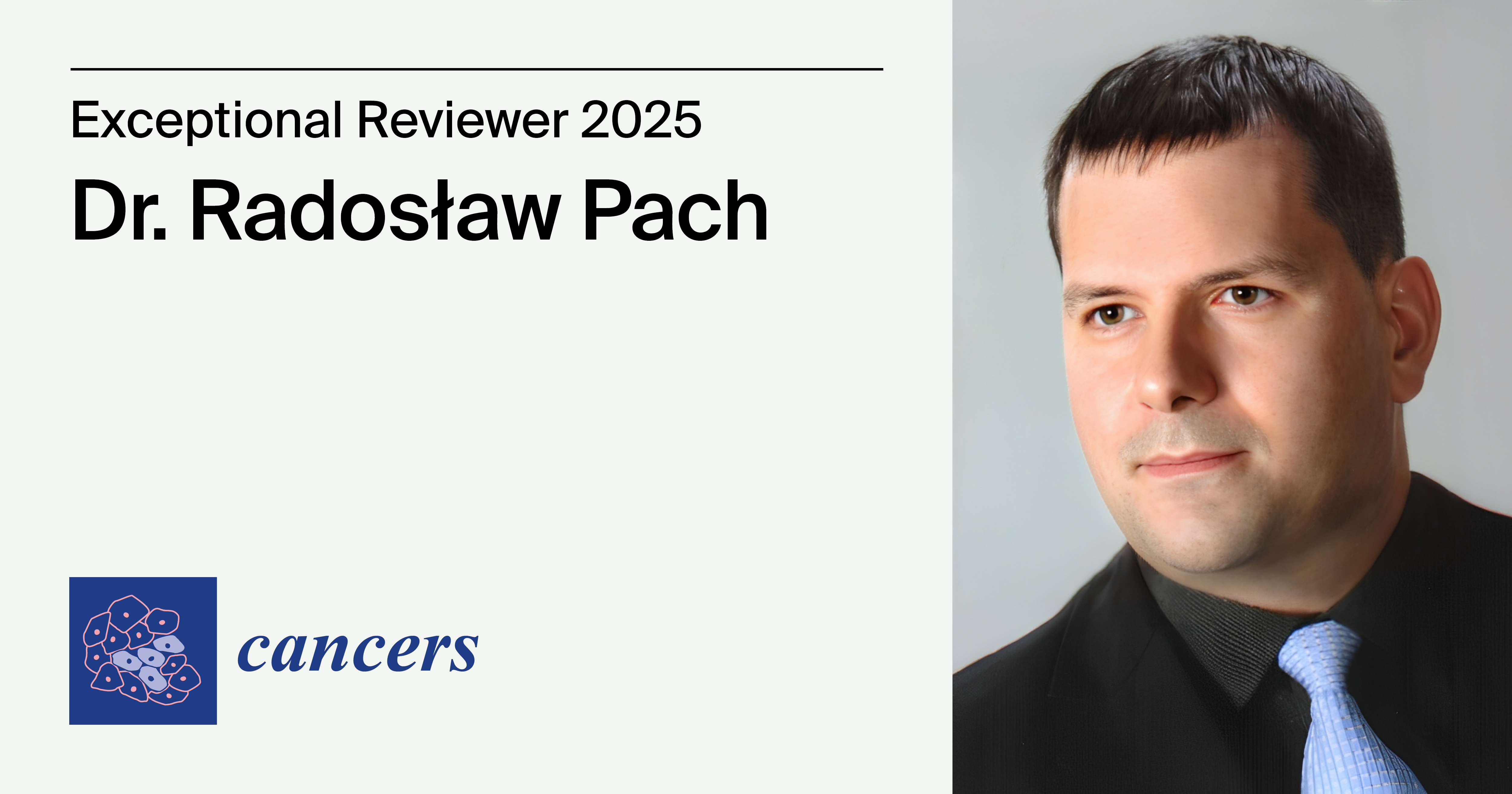
Interview with Dr. Radosław Pach—Cancers Exceptional Reviewer 2025
1. Could you briefly introduce yourself and your current research topic to our readers?
I have been working as a consultant surgeon since 2010 and as a consultant oncological surgeon since 2013. I successfully defended my doctoral dissertation in 2009. My current research topics include: the combined treatment of rectal cancer, HIPEC in gastric cancer, lymph node ratio as a prognostic factor in colorectal cancer, myeloid-derived suppressor cells, disseminated tumor cells in the bone marrow, and many more. Since 2024, I have participated in the Clinical Scholars Research Training conducted by Harvard Medical School. Consequently, I gained deep insight into advanced clinical trial design, complex statistical analysis, and machine learning.
2. What criteria do you consider most important when evaluating a manuscript?
When I assess a manuscript, I evaluate two main factors: novelty and scientific soundness. First, I check how the results contribute to the existing body of knowledge and whether the references include current literature on the analyzed topic. Next, I thoroughly analyze the methodology of the study. I verify the appropriateness of the statistical tests, as well as primary and secondary outcomes. Moreover, I pay attention to the power of statistical analysis. I check whether the results are adjusted for potential confounders in cohort studies or if the analysis takes into account potential effect modifiers. Finally, I verify whether conclusions are drawn based on the results obtained.
3. As a reviewer, how do you balance encouraging research innovation with the strict requirements for methodological reliability? Could you give an example?
I always appreciate innovations in studies. On the other hand, not all creative solutions are potentially of clinical value. First, I assess the pragmatic implementation of the innovative results. In my opinion, innovative research should be accompanied by exceptional methodological quality. Therefore, before publishing manuscripts on novel diagnostic or therapeutic methods, the study design and proper statistical analysis should be verified.
4. Beyond “error correction”, what unique value do you think excellent peer review brings to the academic community?
Peer review supports the editors in evaluating manuscripts. The main purpose of peer review is to provide comments that enhance the quality of scientific papers. It helps to identify and reject papers that lack scientific soundness and contain serious methodological flaws. Excellent reviewers promote originality and relevance, effectively acting as gatekeepers of quality and innovation. In addition, peer review helps build trust among scholars by ensuring that published research is credible, transparent, and reproducible.
5. In your research career, have you had an experience where reviewers’ feedback led to a research breakthrough?
Frankly speaking, I do not remember such a situation. However, several times, reviewers’ feedback led to a substantially improved manuscript quality. The papers were finally published and recognized by the academic community. I guess that there is the possibility that constructive critiques can lead to better-structured and more impactful papers, and foster discoveries based on data presented in the original paper.
6. How do you view the role of a reviewer in shaping the quality and integrity of published research?
In my opinion, the most important aspect of peer review is that, by critically evaluating submissions, reviewers help maintain the scientific and intellectual credibility of journals and disciplines. Through their judgments on significance, reviewers influence what kind of research is valued and supported. They also assess ethical issues within manuscripts and may identify potential plagiarism or data manipulation.
7. What advice would you give to early career researchers who want to become strong peer reviewers?
I recommend that early career researchers become acquainted with epidemiology, the design of clinical trials, and cohort studies, and a broad spectrum of statistical methods implemented in the analysis of study results. Reading the peer reviews, they receive on their papers can also be highly instructive for preparing valuable feedback. Moreover, reading widely helps to recognize novelty, assess relevance, and spot gaps or redundancies in evaluated papers. Finally, peer review enables you to sharpen your own critical thinking and build your academic reputation over time.
